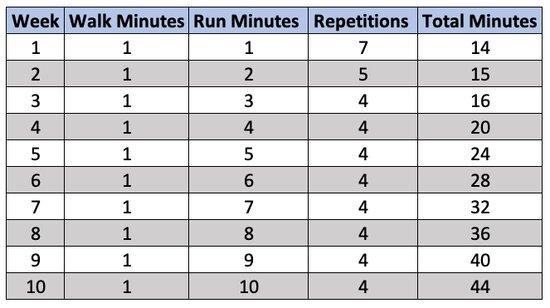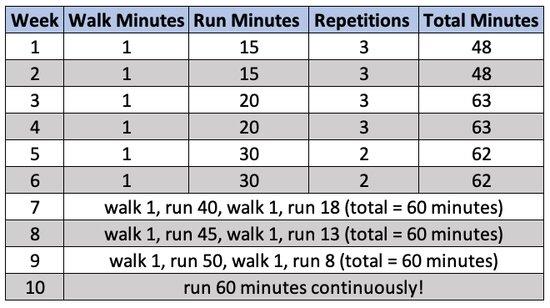
(Note: Some of the links in this post are affiliate links, and we will be compensated when you make a purchase by clicking through our links at no additional cost to you.)
We recently found this blog post on a group in Facebook written by Mark Iocchelli and thought all the beginner runners could benefit from it. We have edited some of the original answers to provide you with the most up-to-date information.
Article Summary: This article was written to answer the most common questions asked by new runners, and by people returning to running after a layoff of at least a few years.
1) Question: How long should my first runs be?
Answer: During the first week, 15 minutes is plenty. After that, your goal should be to increase the time very gradually.
2) Question: What should I do if I can’t run non-stop for 15 minutes?
Answer: Don’t feel badly. In the beginning, most people have trouble running for even a few minutes. In other words, you’re normal! I suggest the following training plan.
Stage One
Gradually weans you off walk breaks so you can comfortably run 60 minutes without stopping. Stage two will get most people ready for a five mile race.

The walk/run method I based the schedule above on is common among many running programs. Walk/run is probably most well known in Jeff Galloway’s program in the U.S.
Stage Two
Gradually weans you off walk breaks so you can comfortably run 60 minutes without stopping. Stage two will get most people ready for a five mile race.

3) Question: How often should I run?
Answer: For beginners, I recommend three or four days a week. I also recommend alternating between running and rest days. This will give your body time to recover and adapt to the stresses you’re giving it.
4) Question: How far should my runs be?
Answer: I intentionally avoid mentioning distance in this plan because if you focus on distance, you’ll likely also start focusing on speed. In the beginning, you should avoid an emphasis on speed because too fast too soon can lead to injury.
5) Question: How fast should I be running?
Answer: You should be able to comfortably carry on a conversation and you should not be out of breath. This is, for some people, a hard guideline to follow because they feel as though they are running too slow. If that’s you, please remember that in the beginning part of your running career it’s vital that you focus on a pace that is comfortable. Why? Because, without getting into the science of it, running too fast too early does not build the proper cardiovascular improvements you need to be a successful runner. So, take your time and enjoy yourself!
6) Question: I’m afraid I won’t be able to stick with the plan – how do I stay motivated?
Answer:
- Sign up for a race. Do it now! Having a race goal (and race fees!) on the line will be a powerful source of motivation. I guarantee it.
- Run with a partner. And promise to get each other through the rough patches. Neither of you will want to let the other down.
- Focus strongly on getting through the first three weeks. It takes roughly three weeks to establish a habit. If you can get past the first three weeks, your mind and body will find it much easier after that.
- Don’t overdo it. Running too fast, too far or too often in the beginning can burn you out, make you sore or get you injured and none of those things are very motivating.
- If you are taking up running to lose pounds, try not to focus solely on weight loss. This is because especially in the beginning of your running career you will likely gain some weight due to muscle growth – a very good thing because muscles burn fat. To get your attention away from the scale, take tape measurements and photos of your body every few weeks. You’ll be happy to see the inches dropping even if the pounds don’t initially follow suit.
- Journal your experiences in a running/training log, running blog or on a forum and connect with other runners for support. You’ll be amazed at just how much support you’ll get!
- Remind yourself often that at the end of the program you’ll be fitter, healthier and will be able to run for non-stop for an hour!

7) Question: How do I know if I’m running correctly?
Answer: This is a wise, common question among beginners. Unfortunately the answers are often not as good as the question. Beginners are often told to run in a manner that feels “natural”. I have a very different opinion. I believe that, for many of us, “natural” doesn’t always mean correct. If you doubt this, ask yourself why it is often said that 50 to 60% of runners are injured every year (please don’t ask me to quote sources!).
The best way to make sure your running form is good is to hire a reputable certified running coach for a one-off session or go to a physical therapist who specializes in running injuries.
Just remember, the earlier you can figure out how to run correctly, the better. Not only will it help prevent injury but it is also very hard to change running form after a few years of running.
8) Question: Should I stretch?
Answer: Only a few years ago, the answer from just about anyone you asked would have been an absolute “yes!”. But more recent research has been telling us other things:
- Stretching before running may actually be bad for you. It may lead to injury.
- It is better to warm up slowly (e.g. by starting out walking) than to stretch before you run.
- Stretching after five minutes of easy running is more advisable than stretching before running.
- Stretching after you run is always a good thing.
- Doing stretching as a standalone activity (e.g. taking up Yoga) can be extremely beneficial to runners.
>>> Why You Should Stretch After Your Workout
9) Question: Should I change how I eat now that I’m running?
Answer: For beginning runners running under an hour a day, nutrition is not a big issue. You really do not need to add anything special to your diet. That said, if your nutritional habits were poor before you started running, this is a good time to fix them. Water is a runner’s best friend. Drink water before and after you run.
10) Question: I am taking up running to lose weight – how much can I expect to lose?
Answer: Ahhh, the age-old question. There are many factors to consider. I could/should write a book (hmmm…). For now, here are a few things for you to think about:
- Running is at the top of the list of activities for the number of calories it burns so you’ve made a good choice including it in your weight loss strategy.
- Many runners don’t lose weight because they reward themselves for running by eating more or binging. So, rewards are sometimes not very rewarding in the long term.
- While you are likely to lose weight running 30 or so minutes three times a week, more pronounced weight loss usually doesn’t happen until you are running more frequently and for longer duration. The message: Stick it through as a beginner and you’ll reap the benefits in much greater quantity for the rest of your running career.
>>> Discover the Top Must Haves Every Women Runner Needs





